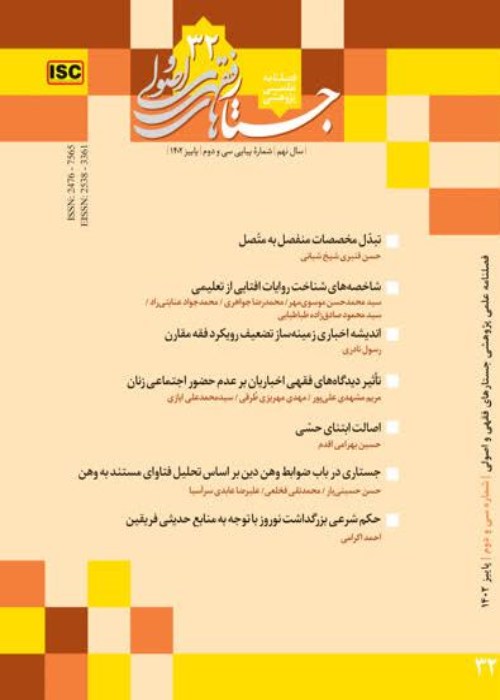Rethinking and Generalization of evidence to Prohibition of Ḥudūd execution in enemy's territory in the Contemporary World
According to the Jurisprudential texts and subsequently dealt with by the Shiite juristsis the prohibition rule of the Ḥudūd execution in enemy's territory. This rule is shaped in two parts: Absolute and Qualified Terms. In absolute terms, the Ḥudūd execution in enemy’s territory is unquestionably prohibited; but, as a qualified meaning, the prohibition of the Ḥudūd execution in enemy’s territory) is the subject to the fear of joining condemned to the Enemy. Concerning "the fear of joining to the enemy," some jurists consider it as the ʿIllat (cause)of ruling, and the others consider it as the Ḥikmat (philosophy) of Ruling. There is, however, a third group who believe that the combination of ʿIllat and Ḥikmat is possible. Accepting the recent view, this study believes that since the fear of joining to the enemy capable to extend to the similar sentences, such as flogging as Taʿzīrī or Qiṣāṣ (Retaliation) is the ʿIllat of ruling and since the absence of this fear and existence of other ramifications the Ḥad sentence and other similar Punishments should not be carried out in enemy’s territory this fear can be considered as the Ḥikmat. According to this writing, formation of international human rights organizations and the advent of technology, make joining to the enemy is much easier than Imam’s era. The consequences of application of these punishments for the Islamic society became more widespread. Also, the development of cyberspace in the age of globalization has reduced the importance of geographical boundaries and has also obscured the meaning of the enemy’s territory. Therefore, rethinking and generalization of this provision (Prohibition the Hudud execution in Enemy’s Territory) to other punishments running in Islamic countries seems essential.
- حق عضویت دریافتی صرف حمایت از نشریات عضو و نگهداری، تکمیل و توسعه مگیران میشود.
- پرداخت حق اشتراک و دانلود مقالات اجازه بازنشر آن در سایر رسانههای چاپی و دیجیتال را به کاربر نمیدهد.



